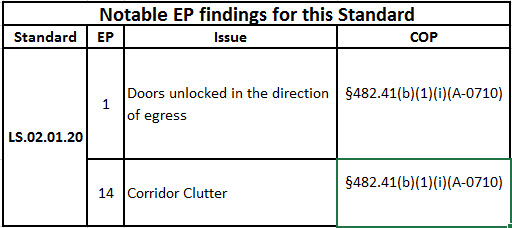Maintain the Means of Egress, clear of obstruction, and appropriate door locking.
Objects stored in the Means of Egress, such as a corridor, restrict staff movement in both normal and emergency situations. Door locking must not place occupants at risk.
Possible staff injuries and reduced evacuation of patients during an emergency situation.
Staff bumping into equipment improperly stored in the means of egress may result in employee health and safety issues. Doors improperly locked may reduce rescue of patients.
Patients at risk during an emergency and possible increase in staff injuries. Doors locked may inhibit rescue of patients and staff.
Staff injuries reduce the work force, and may increase workers compensation. Patients that are unable to be quickly transported because of corridor clutter may reduce patient care delivery or rescue. Doors improperly locked may also reduce rescue efforts in an emergency situation.
Remove all objects stored in the Means of Egress, including patient corridors. Follow all door locking provision.
Maintaining a clear and unobstructed means of egress improves patient flow, and following locking provisions ensures ready access as needed.



